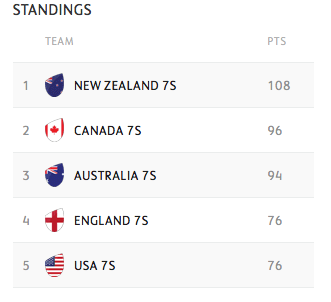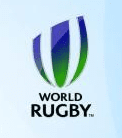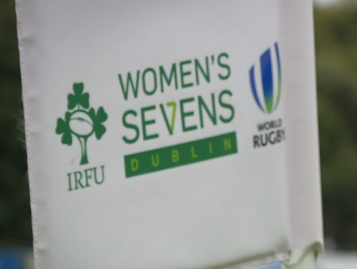
 PHILADELPHIA, PA – The Women’s 7s Series has been cut to just 4 tournaments while the Men’s series has been expanded to 10 tournaments. As I was reading releases and watching videos in preparation for the USA Womens 7s preview I posted earlier this week, the difference in number of tournaments became harder and harder to understand. Here is the blurb posted on the “About the Women’s Sevens Series” tab on the World Rugby website.
PHILADELPHIA, PA – The Women’s 7s Series has been cut to just 4 tournaments while the Men’s series has been expanded to 10 tournaments. As I was reading releases and watching videos in preparation for the USA Womens 7s preview I posted earlier this week, the difference in number of tournaments became harder and harder to understand. Here is the blurb posted on the “About the Women’s Sevens Series” tab on the World Rugby website.
“The Series takes place in five global destinations underlining World Rugby’s commitment to the ongoing growth and development of women’s rugby around the world and is another significant step in the journey to Rio 2016.
“The 2015-16 series will be the fourth for the women’s teams and so far New Zealand have held sway winning all three. Coupled with the power of sevens’ admission into the Olympic games, the series has sparked significant growth in the women’s game with increased appetite for broadcast, live streaming and social media. In fact, women’s rugby is now one of the fastest-growing team sports in the world.
“Ireland and Japan won through a tough qualifying competition in Dublin in August 2015 to secure core team status on the HSBC World Rugby Women’s Sevens Series in 2015-16, and join the other ever-presents, defending champions New Zealand, Canada, Australia, England, USA, France, Russia, Fiji and Spain.
“The Women’s Sevens Series concept is in line with key strategic objectives set out in the World Rugby Women’s Rugby Plan, expanding the women’s Sevens international competition model, particularly at the elite level of the game.”
 Of note, this claims there will be 5 tournaments. When I emailed World rugby to try to understand why there are so far only 4 tournaments scheduled, Eoin McHugh replied that they are not done announcing the full schedule for 2016. Also of note is the claim that the series has “sparked significant growth.” That claim seems reasonable and justifiable, but it does seems odd to hold fewer events if those events are creating the growth that World Rugby wants. Lastly, the blurb states that it is a goal of World Rugby to expand “the women’s Sevens international competition model.”
Of note, this claims there will be 5 tournaments. When I emailed World rugby to try to understand why there are so far only 4 tournaments scheduled, Eoin McHugh replied that they are not done announcing the full schedule for 2016. Also of note is the claim that the series has “sparked significant growth.” That claim seems reasonable and justifiable, but it does seems odd to hold fewer events if those events are creating the growth that World Rugby wants. Lastly, the blurb states that it is a goal of World Rugby to expand “the women’s Sevens international competition model.”
Hmmm.
World Rugby sees Women’s 7s tournaments an investment in growing the game. That makes sense. What doesn’t make sense is claiming that the investments are bringing a good return while not having more tournaments. It is possible that the responsibility lies not with World Rugby but with the member unions. There is no women’s tournament this season in New Zealand, or Australia, or South Africa, or England, or France. Those nations are all hosting tournaments for men.
Here is part of an email I sent to McHugh:
“Any insight into this would be very much appreciated.”
There was no reply.
Maybe some money that was spent on women’s tournaments last year is being spent on the Olympic Repachage tournaments. If that is true, surely it is also true for the men, and their World Series was expanded, not contracted. Criticism of World Rugby for its hypocrisy and failure to supports women’s 7s is deserved.
Why We Need to Do Better
Sites like Rugby Wrap Up also have an obligation to women’s rugby, though the nature of the obligation is entirely different from that of World Rugby, its member unions, and things like schools whose purpose is to serve the needs and interests of all of their students.
As much as we, people who are writing about rugby in North America, are reflecting and responding to the market that already exists, we are also trying to create the market we want to exist.
Right now, the rugby market in North America is relatively small. Any site dedicated to covering rugby in North America is also dedicated to promoting rugby in North America. We might not think of everything we write as being promotion, but simply by giving up time we could spend on other things to prioritize the sport, we are arguing for its expanded popularity. I write about a thing that I want others to care about. Simply by writing about it, I am arguing for its value. If more people care about it, that increases the market, and that has to be good for people like me and sites like Rugby Wrap Up.
The more people who care about rugby, the better off we “journalists” are. The more rugby competitions and matches we treat seriously, the more of a product there is for others to care about. It makes no sense to draw the line at women’s rugby. Yet, that is what I have largely done. I plan to do better.

It also matters, though, that the access to cover women’s rugby is entirely open. Televised coverage of the sport is a barrier, but a barrier to both men and women. There is nothing, however, from stopping people who follow women’s rugby closely from starting their own site or from writing for existing sites. It is a mistake to wait for someone else to do it. Writing about the lack of coverage women’s rugby receives is good and fair, but I think even better is directly creating the kind of coverage that ought to exist.
This is a confession of sorts, though I am not sure it makes sense to confess to something that anyone who cares to see can already see – my lack of proper attention to women’s rugby. It is also a call to action. Provide the coverage you wish existed. At times, that will be hard because information is sometimes hard to find and relatively few women’s matches are broadcast or streamed. Still, the more of us who are not only consuming but also creating content about women’s rugby, the better off all of us will be.
That’s it… Feel free to comment below, look for and “Like” our Facebook Rugby Wrap Up Page and follow us on Twitter@: RugbyWrapUp, Jake Frechette, Junoir Blaber, James Harrington, Jamie Wall, Nick Hall, DJ Eberle, Scheenagh Harrington, Jamie Loyd, Cody Kuxmann, Karen Ritter, Audrey Youn, Akweley Okine, Rocky Brown and Declan Yeats, respectively.

